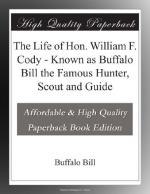Generals Crook and Terry spent that evening and the next day in council, and on the following morning both commands moved out on the Indian trail. Although General Terry was the senior officer, he did not assume command of both expeditions, but left General Crook in command of his own troops, although they operated together. We crossed the Tongue river to Powder river, and proceeded down the latter stream to a point twenty miles from its junction with the Yellowstone, where the Indian trail turned to the southeast in the direction of the Black Hills. The two commands now being nearly out of supplies, the trail was abandoned, and the troops kept on down Powder river to its confluence with the Yellowstone, and remained there several days. Here we met General Mills, who reported that no Indians had as yet crossed the Yellowstone. Several steamboats soon arrived with a large quantity of supplies, and once more the “Boys in Blue” were made happy.
CHAPTER XXXI.
DANGEROUS WORK.
One evening while we were in camp on the Yellowstone at the mouth of Powder river, I was informed that the commanding officers had selected Louis Richard, a half breed, and myself to accompany General Mills on a scouting expedition on the steamer Far West, down the Yellowstone as far as Glendive Creek. We were to ride on the pilot house and keep a sharp lookout on both sides of the river for Indian trails that might have crossed the stream. The idea of scouting on a steamboat was indeed a novel one to me, and I anticipated a pleasant trip.
At daylight next morning we reported on board the steamer to General Mills, who had with him four or five companies of his regiment. We were somewhat surprised when he asked us where our horses were, as we had not supposed that horses would be needed if the scouting was to be done on the steamer. He said we might need them before we got back, and thereupon we had the animals brought on board. In a few minutes we were booming down the river, at the rate of about twenty miles an hour.
The steamer Far West was commanded by Captain Grant Marsh, whom I found to be a “brick.” I had often heard of him, for he was and is yet one of the best known river captains in the country. He it was who, with his steamer the Far West, transported the wounded men from the battle of the Little Big Horn to Fort Abraham Lincoln on the Missouri river, and on that trip he made the fastest steamboat time on record. He was a skillful and experienced pilot, handling his boat with remarkable dexterity.
While Richard and myself were at our stations on the pilot house, the steamer with a full head of steam went flying past islands, around bends, over sand bars, at a rate that was exhilarating. Presently I thought I could see horses grazing in a distant bend of the river and I reported the fact to General Mills, who asked Captain Marsh if he could land the boat near a large tree which he pointed out to him.




